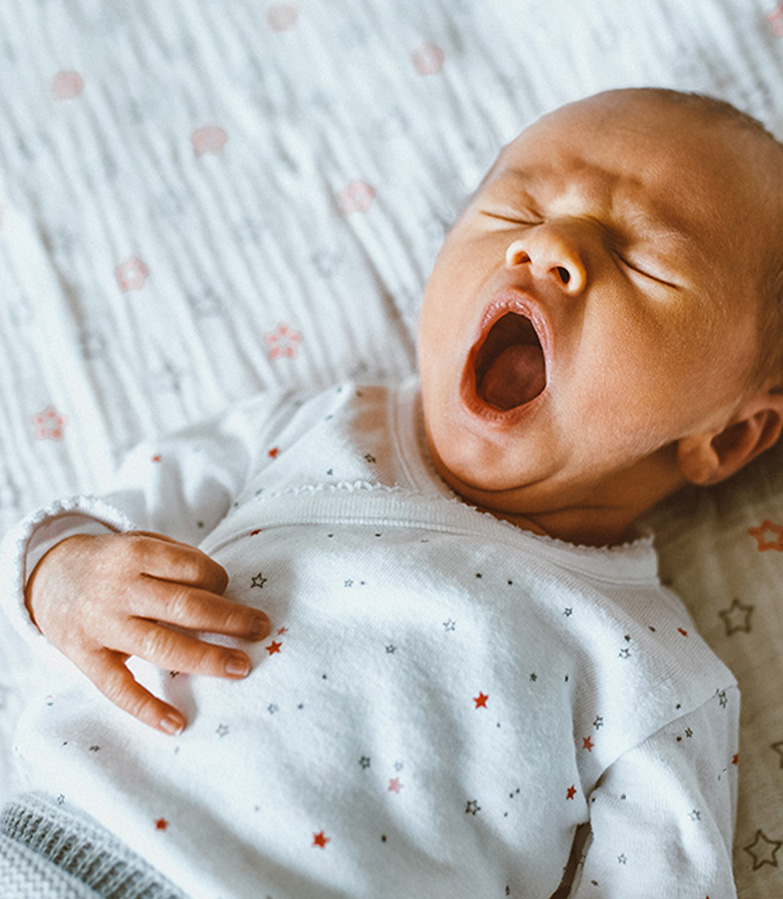Going Out to Dinner with Kids While on a Sleep Schedule
Baby Sleep Secret Revealed: How Naps Impact Overnight Sleep
Every parent wants a well rested baby. Babies who get enough sleep are happier….and have parents who are happier, too. After all, if baby isn’t sleeping, neither are Mom and Dad.
But many parents don’t know this one simple secret trick to having a baby who sleeps better at night.
What is it, you ask? Babies who nap well during the day will sleep well during the night. We’ve all heard people say things like, “Better not let them nap too much if you want sleep tonight”…but maybe we need to re-think that!
Babies who take good naps will actually sleep better overnight (and babies who take good naps have parents who get more sleep at night, too!). Keeping a baby up longer during the day will not tire them out for a good night’s rest. In fact, one of the most important factors in sleeping through the night is a well-rested baby.
What Happens When a Baby is Sleep Deprived?
To understand why this is true, let’s take a look at what happens when a baby is not well rested. Have you ever stayed up later than usual and experienced a second wind? That surge of energy is from the stress hormones, cortisol and adrenaline. Your body produces them because it senses that something is wrong. You did not go to sleep when your body clock said it was time.
This is what happens to a baby who misses the right time to go down for a nap. The difference is that it’s much harder for a baby to handle. His body experiences stress and the increased energy makes it even more difficult for him to fall asleep.
If he continues to miss out on restorative sleep, his body becomes exhausted. Meanwhile, the stress hormones keep him more and more alert. It’s a vicious cycle…and a really unpleasant one for both your little one and you. No one wants to live with all that stress, especially if you can solve the problem with such a simple solution: nap time!
This cycle of over-tiredness is why we cannot just let little ones sleep when they want to. They need our help. The primary goal of sleep training is a well-rested baby.
A Well-Rested Baby

Ensuring that your baby falls asleep before the stress hormones roll in makes all the difference. A baby who was fully restored at their last nap will sleep soundly and happily through their next sleep. Night sleep will come in longer stretches.
Many people do not realize how short a time babies are meant to stay awake before napping. A newborn sleeps almost all the time. Even a four-month-old can barely make two hours before it is time to put her down.
Good sleep has more benefits than begetting more of itself too. You will see a more alert and content infant who cries and fusses considerably less. You might even see your infant start to meet her milestones at a faster pace.
The Sleep Training Process
Sleep training has two parts: getting your baby on a developmentally appropriate sleep schedule and teaching your sweet baby to fall asleep on his own.
You and your baby work together on this: the routine is parent-directed while the independent sleep skills have to come from the baby. Your job is to set him up for success by getting all of the external factors right. We get the schedule perfect and provide an environment conducive to sleep. The rest is up to him, and it takes a bit of practice.
A severely overtired baby needs to recover from the massive sleep debt he has accumulated. At the start of sleep training, you may notice that your baby suddenly sleeps a huge amount. He may seem tired all the time, and this is normal. Once he gets in sync with his schedule and the independent sleep skills begin to click, the stress hormones clear his system. To his sweet relief, he’s catching up on the sleep he needs. After a few days of recovery, he should get into a sleep routine normal for his age.
Is Sleep Training Stressful for the Baby?

Parents sometimes worry that sleep training causes intense stress for a baby. Articles float around about cortisol levels spiking during sleep training. And it’s good to be concerned for your baby and want what’s best for him. But it’s also important to get all the facts so you can make the best decision.
First of all, sleep training often means a big change in how, when, and even where babies go to sleep. Any changes will be stressful. However, this can be done in a gentle way and it doesn’t have to mean shutting the door and letting baby cry all night.
Proper sleep training takes into account a baby’s individual needs and gently guides him to a new way of getting more restorative sleep. While any change creates a small amount of stress, sleep training works towards eliminating the unhealthy buildup of cortisol. In the long run, it prevents stress that might otherwise stay with the child over a long period!
And you don’t have to figure it all out alone, either. We’re here to help.


